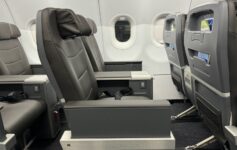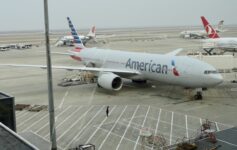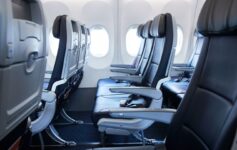The world just learned about the importance of flattening the curve of coronavirus, but airline unemployment has a curve too and we need to flatten that as well.
If you are considering booking travel or signing up for a new credit card please click here. Both support LiveAndLetsFly.com.
If you haven’t followed us on Facebook or Instagram, add us today.
Flattening The Curve
The coronavirus has introduced two principals of exponential growth and capacity to the world. “Flattening the curve” has been the easiest way to understand the importance of stemming the exponential growth of the virus to a manageable level below what the healthcare system can handle.
If the exponential growth curve is not flattened below the level in which the healthcare system of a given geography can manage it, the system will fail which affects not only patients of the virus but also other emergency patients and other ill victims that fail to get the care they require.
If the curve can be flattened under what the system can manage then even at elevated levels for a portion of time, the system doesn’t fail and eventually, cases decrease and life returns to normal.
The Airline Unemployment Curve
The airline industry involves several very specialized career sectors. Pilots, flight attendants, aircraft mechanics, baggage and cargo managers, fleet and route management and many more. These are careers that are highly valuable within the industry but are tough to re-purpose outside of the airline business.
In the general course of business, pilots will retire, opportunities arise elsewhere (like the recent mass expansion of LCCs in Europe and Asia) and the industry can absorb the ebbs and flows even when a major carrier goes out of business. The industry can add enough to capacity over time and a number of carriers and geographies to keep the curve flattened underneath the available jobs line.
But when every US carrier states that they will not be able to make it 90 days without a bailout, the concept of not bailing them all out creates a one-time spike that will eventually go down but will temporarily shock the economic system.
If no bailout was available and all the airlines went out of business tomorrow, more than 300,000 flight attendants alone, would be competing for jobs without a similar sector to their experience. The service economy, already struggling in this environment, would be inundated with applications.
If we pretend that every airline employee found a field adjacent to their career path, would those jobs pay enough to continue to support the flight attendant’s mortgage, the airline mechanic’s student loans? The system is designed to have some elasticity and absorb some level of shock, but an instant, sharp rise would be more than our economic system could manage.
The Cost of Airline’s Going Out of Business
There’s a reason the bailout is cheaper than sending everyone a direct check, it’s the knockdown effect. If American, Delta, and United were all refused a bailout and all went out of business, they would not only put those employees on to the job market (as outlined above) but their bankruptcy would force a default on their loans for jets (some that were financed by the US government.) There wouldn’t be an obvious customer for their assets because all airlines throughout the world are in the same position with a lack of demand, excess equipment and employees and an uncertain future.
The average unemployment entitlement in the US is $515/week for a maximum of 26 weeks. The airlines have already paid into this so it’s not necessarily a burden on the taxpayer, but that also assumes the maximum earnings have been achieved, resulting in the maximum payment. Many airline employees would not receive this full amount, which is taxed as normal income, netting in far less to out of work employees. The burden then falls to governments to help with SNAP payments, financial assistance, programs, and aid.
It Spills Into Other Areas
Let’s assume a situation in which the airlines are all true, that none of them could make it through this without the bailout (could be true, could be false, no one really wants to find out) and go out of business. There are more than 500,000 direct employees working for the airlines, but that’s not really the whole picture.
There are hundreds of thousands of periphery employees that will also lose their jobs and face hardship, here are some:
- Caterers (tens of thousands from truck drivers, cooks, packaging, executives, etc.)
- Contract airport personnel (checkin counters, gate agents, lounge personnel)
- Fuel services (truck drivers, facility managers, etc.)
- Uniform manufacturers, cleaners, renters (Cintas, Aramark, and other uniform suppliers)
- Hotels (some rely on crew traffic)
- Shuttle services (for crew transport to and from the airport)
- Taxi/Uber/Lyft drivers
- Airports (sanitation, management, vendors and employees of those vendors)
- Mail, cargo (USPS packages and other cargo that relies on the airlines for quick transportation)
- Packaged food (farmers, paper, packaging, transport)
Let’s look at that last category and run this model out. Think about just the tiny pretzel packets on Southwest flights. The farmers that supply the raw materials (wheat, butter, eggs, salt, yeast, sugar, etc.) will have mass order cancellations. The product (perishable) will either go to waste or liquidated at a loss. The employees that work those farms, the processing facilities, the trucks and trains that shift the materials will all have to cut hours, let employees go and stop shipments.
The same happens at the pretzel bakery, which could go out of business because their equipment and building leases and payments won’t stop but they no longer have any revenue to offset the costs. The landlord or bank that owns the property will have to deal with the loss of revenue, an asset that they have to offload (maybe at a loss) and what to do to recover those losses and the reduced need for personnel.
All of those that are out of work, are competing for fewer jobs available making it even longer before the economy returns to full recovery.
While it would be difficult to enumerate all of the jobs that are directly linked to the continued operations of US commercial air travel, the losses would be perhaps larger than the airline industry alone.
Conclusion
The bailout approved by congress allows for taxpayers to obtain equity in the airlines in exchange for cash and right now, that’s probably a great investment. The airlines will also have access to low-interest loans which are not giveaways. In the credit crisis of 2008, the auto industry paid back their loans and continued to grow their businesses, which was a good investment for the American people.
As much as we may not like to bail out the airlines, it really is needed to keep the entire industry and their dependent vendors afloat.
What do you think? Would an exponential spike blow apart the airline business? Is a bailout better than unemployment? Or should the government let companies of all sorts (airline or otherwise) fend for themselves?
If you are considering signing up for a new credit card please click here and help support LiveAndLetsFly.com.




I can tell you this.
I am getting fat. This quarantine is killing me. Trump please open the economy. I am willing to sacrifice many, many Republicans for a chance to go and caress the sun.
I don’t care. Generous unemployment for six months. No more. Tell airlines that the government expects them to be half the size with half the routes and with half the employees in six months. If airlines wanna hang on to pilots and mechanics to prevent retraining, let them make accommodations.
But to have me, the taxpayer, foot an annualized to $66,000 bill for each employee is ridiculous. Half need to go now, not at $66,000 annualized, but on juiced unemployment benefits.
Why does this Need to happen:
A. The taxpayer is broke. This is not magic money. U can’t rob someone who is already devastated.
B. The corona damage is real. Everyone is going to feel pain and no money printing press is going to fix the lost economic output.
C. Many others are just as hurt by this. Why don’t they get to not work and collect full salary for six months?
D. The airlines and flight attendants, thru their arrogance and always feeling like they are in control of the cattle class in the back, have engendered no sympathy.
E. Had not government stopped most travel, the demand would not be there anyway. Government didn’t make them grind to a halt, a virus did.
This is my, the taxpayer’s money. Airlines have accept most of their employees are gonna be out of a job, now and in six months. I am not against boosted unemployment and cheap loans and something that pays for an airline industry that’s 35% of the current size on the other side of this crisis.
Everyone is going to be hurt by this. Why rob one group to pay another? And it is robbing. Printed money and tax payer money both directly steal taxpayers’ wealth.
Thanks for always tackling the controversial questions Kyle, I appreciate it!
From a CNN article in 2016: “Delta pilots have an average base pay of $185,000, according to the airline. That’s less than the average of $190,000 at Southwest (LUV), $205,000 at American and $209,000 at United.”
I assume it’s at least 30% higher today.
The need for pilots right now is < 10% of what it used to be; FAs even less.
Will the airlines keep paying their pilots at these salaries through the government mandated freeze in letting people go? Does it make sense?
And don't get me started on the obnoxious seniority rules they have..